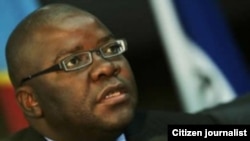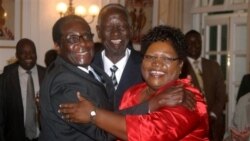As Zimbabweans pay close attention to the political developments in the country, sparked by the recent emergence of former Finance Minister Tendai Biti as the leader of the newly formed and renamed People’s Democratic Party (PDP), and possibly former Vice President Joyce Mujuru, who last week launched a Manifesto which outlined the way forward for Zimbabwe, a Washington-based analyst says the events are not grabbing headlines in the U.S.
Senior policy analyst Marion Tupy of the Center for Global Liberty and Prosperity (CATO Institute), said part of the reason is that Zimbabwe has taken a back seat to other developments of more interest and concern to the U.S.
“Getting interest in Washington [about] what is happening in Africa in general, and Zimbabwe in particular, was difficult in the best of times, and of course these are not the best of times,” said Tupy, explaining further that, “we have troubles in Russia and Ukraine, we have the Chinese market meltdown, we have the presidential cycle, which is about to take off.”
Tupy said the U.S. interest in Zimbabwe waned after the dissolution of the 5-year unity pact between President Robert Mugabe’s Zanu-PF and the opposition Movement for Democratic Change, with Morgan Tsvangirai as prime minister and Arthur Mutambara his deputy.
“At the time when MDC was rising and Tsvangirai was being beaten up and mistreated by the Mugabe regime, people you know, were looking at Zimbabwe with hopefulness.”
He said at the time, the U.S. looked at Zimbabwe as a country worth saving. Now, however, said Tupy, the hopefulness ended with MDC’s electoral loss to Zanu-PF in July 2013, and the continued decline of the country’s economy and other critical areas.
“We are at a very different stage in terms of how people look at Zimbabwe now,” Tupy said. “People now look at the country as basically a failed state, they look at the economy as essentially a destroyed economy,” said Tupy adding that the flight of human capital or skilled Zimbabweans has exacerbated the problem.
In light of this, Tupy said Mujuru is unlikely to get favorable reception because many see her as part of the reason for the country’s decline.
“So, when people look at someone like Joyce Mujuru, someone who has been complicit in some of Mugabe’s greatest crimes, somebody who has never spoken against corruption, malfeasance, mis-governance, why should anybody think that Joyce Mujuru is getting into politics for any other reason than self-enrichment and power grabbing?” Tupy asked.
“… I don’t think people see Joyce Mujuru as a breath of fresh air, she’s deeply tainted with her past association with the Mugabe regime, and she’s definitely not somebody the United States must put great hopes in,” Tupy concluded.
As for Biti and his new PDP, a breakaway from the original MDC led by Tsvangirai, under whom he served as secretary general, Tupy said despite his successes in helping turn around the economy, and likely gaining U.S. support, he doubted Biti could win the presidency through the ballot.
“Even if he [Biti] was an economic genius, do I think that the current rulers of Zimbabwe, the people who matter, the military, the Zanu-PF politburo, do I think they are going to permit him to take over at the next election,?” he asked with a pause. “No I don’t,” and added that the country is likely going to continue declining.
Despite the recent visits to Zimbabwe by Deputy Assistant Secretary of State for Africa, Shannon Smith, and the congressional delegation led by Gregory Simpkins that followed soon after, Tupy argued that the visits do not signal a change or improvement in U.S.-Zimbabwe relations, nor indicate that Zimbabwe is any more relevant to the U.S. now than it was before.
He said assurances by both of Zimbabwe’s continued importance to the U.S., was merely diplomatic talk.
“What are they going say?” Tupy quizzed. “They are not going to go to Harare and say Zimbabwe is at best, of little importance to the United States. So, it’s just a matter of diplomatic language. Every country is of importance to the United States.”
Tupy said a huge hindrance to potential investors flocking to Zimbabwe to do business is the unpredictable climate, that is suspended by political uncertainty and skewed laws.
“I can assure you … that large scale, western investment in Zimbabwe is a complete pipe dream, absolute pipe dream, so long as Zimbabwe does not restore the rule of law, so long as Zimbabwe does not restore private property rights, and so long as the indigenization law remains in place,” said Tupy.
Asked if the CATO Institute would host either Mujuru or Biti as they did Tsvangirai while he was opposition leader and prime minster, Tupy answered: “Mr. Biti, certainly, Mrs. Mujuru I think it would be either her or me at Cato,” he said and laughed, adding, “I certainly not imagine me being in the same building with her. I mean this is, as a I said, a woman who is deeply, deeply linked to some of the worst abuses of the Mugabe regime.”














